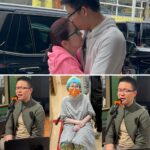The lights of the Bigg Boss house never dim. Every whisper, every glance, every unspoken thought is captured and projected to millions of viewers. Yet, behind the carefully curated persona of a contestant lies a private life, a past shaped by experiences unseen. For Tanya Mittal, one of the most talked-about contestants of Bigg Boss 19, the spotlight has revealed more than just her strategic gameplay. It has peeled back layers of her life, exposing the complexities of family, personal trauma, and resilience.
From Gwalior to Mumbai, Tanya’s life has been a journey of contrasts. Publicly, she is polished, confident, and articulate — a young woman capable of navigating a house full of rivalries, alliances, and constant scrutiny. Privately, she carries the weight of a childhood shadowed by strict discipline, moments of fear, and decisions that tested her very sense of self. Her father, Amit Mittal, a businessman from Gwalior, was a figure both respected and feared, whose stern rules and expectations shaped much of her early life.
“I grew up in a household where silence often spoke louder than words,” Tanya confessed during a tearful weekend episode. The cameras captured her vulnerability — her hands clasped, her voice breaking as she recalled moments of punishment that left her feeling trapped and isolated. Her revelations stunned the audience. Millions of viewers who had only seen the glamorous side of her life were suddenly confronted with a more nuanced reality.
It wasn’t just discipline; Tanya described a childhood punctuated by moments that left emotional scars. “There were times I felt so trapped that I thought life itself was too heavy,” she shared. Such candidness was rare, especially in a reality show setting where drama is often manufactured. Tanya’s words were raw, unscripted, and deeply human.
Her family’s absence from the public eye became more understandable in this light. While media speculation had often questioned why her family never appeared or defended her publicly, Tanya’s personal stories provided context. The protective distance was not neglect but a shield — a way to allow her to navigate her career and reality show journey without undue exposure. It was a reminder that every contestant is more than the curated image seen on screen; they are the sum of experiences, struggles, and choices.
Social media responded predictably. Clips of Tanya speaking about her past went viral, sparking debates and discussions. Some viewers criticized her, misinterpreting her vulnerability as a strategy to gain sympathy. Others expressed empathy, applauding her courage to share personal trauma in a public forum. The conversation highlighted a broader societal tendency: fascination with celebrity struggles, often divorced from the humanity behind them.
Despite the scrutiny, Tanya maintained composure and poise. She described the impact of early pressures on her career ambitions, detailing how she learned to assert herself and pursue independence. At 19, she nearly faced an arranged marriage that would have derailed her aspirations. The tension between familial expectation and personal ambition became a recurring theme in her narrative. “I wanted to make choices for myself,” she reflected. “And that fight was my first lesson in resilience.”
Inside the Bigg Boss house, her strategic gameplay often intersected with her emotional narrative. Fellow contestants witnessed moments of empathy, decisiveness, and occasional defensiveness — all shaped by years of learning to navigate both external expectations and internal doubts. Tanya’s past influenced not only her reactions to tasks and conflicts but also her alliances and conflicts, making her both a polarizing and compelling figure.
Meanwhile, outside the house, fans debated endlessly. Was Tanya exaggerating her struggles? Was her portrayal of family absence a calculated move to gain sympathy? Each statement she made was dissected, shared, and analyzed. The reality was simpler: her family had remained private to protect their lives and support her autonomy, while Tanya navigated the pressures of fame and public scrutiny on her own terms.
Tanya’s entrepreneurial side also revealed a dimension often overshadowed by drama. Her father’s involvement in real estate and business had given her insights into financial independence, responsibility, and decision-making. She spoke about owning multiple businesses and managing investments — skills that underscored her intelligence and self-reliance. Viewers were reminded that behind glamour and conflict lies dedication, planning, and the subtle mastery of life skills often unseen on camera.
During a particularly emotional episode, Tanya reflected on the duality of fame. “Being seen by millions doesn’t mean being understood,” she said. Her statement resonated widely, capturing the paradox of celebrity life: constant visibility, but limited comprehension. She acknowledged the pressures of public judgment while affirming her identity beyond media narratives.
Her story also highlighted the interplay of social media, public perception, and personal trauma. Viral moments, commentary threads, and fan speculation often painted a distorted picture. Tanya’s candid accounts countered the rumors, offering authenticity in a landscape where reality is frequently curated and sensationalized.
Within the house, Tanya’s interactions revealed her depth of character. When confronted by contestants who questioned her lifestyle or decisions, she responded with grace tempered by assertiveness. She explained her choices, shared personal anecdotes, and at times, retreated to reflect. Her resilience inspired both allies and skeptics, showing that emotional intelligence can coexist with strategic gameplay.
Viewers were particularly moved when she recounted how early adversity shaped her empathy toward others. Witnessing conflict, navigating misunderstandings, and managing criticism became second nature. These qualities — born of necessity — allowed her to navigate the volatile environment of the Bigg Boss house with both strength and vulnerability.
Tanya’s revelations also prompted a conversation about mental health, resilience, and familial dynamics. Experts and commentators discussed the importance of supporting children through trauma, the lasting effects of strict parenting, and the ways in which survivors develop coping mechanisms. Tanya’s public openness served as a catalyst for dialogue, extending her influence beyond entertainment into social awareness.
Over weeks, Tanya continued to balance emotional exposure with performance. She participated in tasks, bonded with some housemates, and faced criticism from others. Each challenge became a reflection of both her strategic acumen and the lessons learned from her formative years. The intersection of past trauma and present resilience became a defining narrative of her season.
Outside, fans shared stories of personal connection. Many related to her experiences of strict upbringing, familial distance, or social scrutiny. Tanya became not just a contestant but a symbol — a reminder that vulnerability and strength are not opposites but complementary forces. Her journey illustrated that authenticity resonates more profoundly than spectacle alone.
By mid-season, Tanya’s family background, once shrouded in mystery, became a topic of broader discussion. Her father’s absence from public events was contextualized as protective, a conscious choice rather than neglect. This clarification helped audiences understand the pressures faced by those living in the shadow of fame.
Ultimately, Tanya’s story emphasized the importance of agency, autonomy, and self-definition. While external observers debated her motives, she navigated her path with clarity, balancing strategic decisions, emotional honesty, and self-care. The narrative revealed that even in the spotlight, personal integrity and resilience remain paramount.
In interviews following her Bigg Boss season, Tanya spoke about the lessons learned. “Life in the public eye is complex, but my journey has taught me that truth, even when uncomfortable, has value,” she said. “I’ve learned to stand by my experiences, honor my past, and make choices that reflect who I am, not just what others expect.”
Her reflections resonated with audiences, inspiring discussions about family, trauma, and the pressures of celebrity. Tanya’s story served as a case study in resilience, demonstrating how personal history informs public behavior and shapes emotional intelligence.
Months after the show, Tanya’s career and personal life continued with a sense of agency and focus. She engaged in professional projects, philanthropic initiatives, and mentorship, all while maintaining privacy regarding her family. The narrative crafted by rumors and speculation gradually gave way to one of empowerment, illustrating that public curiosity cannot define a person’s lived reality.
In the end, Tanya Mittal’s experience on Bigg Boss 19 offered lessons far beyond entertainment. It highlighted the hidden layers behind public personas, the enduring impact of childhood experiences, and the strength required to navigate both fame and personal history. Her story reminds us that behind every headline is a human being — complex, resilient, and capable of transforming trauma into wisdom.
And as the cameras fade and the audience moves on to the next season, Tanya stands as a testament: resilience is built quietly, strength is forged through trials, and the human spirit remains unbroken even under relentless scrutiny.
News
Bigg Boss 19: Tanya Joins Ashnoor in Dramatic Task
Bigg Boss 19 Episode 52, aired on 14th October 2025, brought fans to the edge of their seats as Tanya…
Bigg Boss 19: Zeishan Quadri’s First Eviction Interview Reveals Shocking Insights
Bigg Boss 19 has been full of twists, surprises, and emotional confrontations, but the first eviction interview of Zeishan Quadri…
Who Did Ashnoor and Tanya Nominate? Bigg Boss 19 LIVE Reveals Shocking Choices
The Bigg Boss 19 house is buzzing with tension as Ashnoor and Tanya made their nominations during the latest live…
Emotional Moment on Bigg Boss 19: Tanya Cries Following Revealing Incident
Bigg Boss 19 has once again delivered an emotional rollercoaster as Tanya was seen breaking down in tears during a…
Bigg Boss 19: Ashnoor and Abhishek Team Up Against Gaurav in New Promo
The Bigg Boss 19 house has once again become a hotbed of tension as Ashnoor and Abhishek align against fellow…
Bigg Boss 19: Explosive Fight Erupts Between Farhana and Shehbaz in Latest Promo
Bigg Boss 19 is once again making headlines with intense drama, this time centered on the fiery clash between contestants…
End of content
No more pages to load












